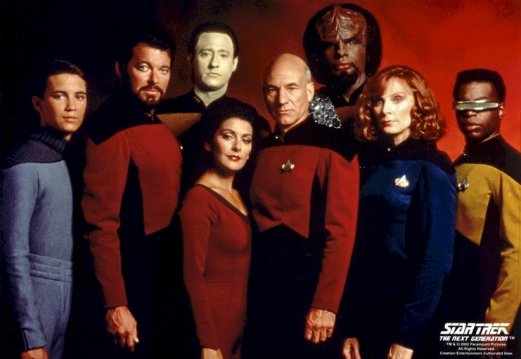Measure of a Man: The most exciting episode of Star Trek (and it doesn’t have any action)
Do you have a soul? Do I? Does anyone? What is a soul? Is it a metaphysical force that contains ‘you’ that our bodies simply house? Or is it just a glorified name for the summation of electrical impulses in a human’s brain? We all have our own view on which of these (and other) answers are true. However, none of us truly ‘know’ which is the case. In the Star Trek: The Next Generation (or Next Gen) second season episode Measure of a Man this question is asked and thoroughly explored. Whilst this is a question well covered in science fiction and hundreds of years of philosophy this episode brings a definably Trek sensibility to the question.
The story concerns the android Enterprise crew member ‘Data’ fighting to be legally defined as a sentient life form, as opposed to property of Starfleet; the military/science/exploration arm of ‘The Federation’; a democratic unity of many planets and species. The episode opens with Data sitting down for a game of poker with his shipmates, engineer O’Brien espouses the view that he needs to sit on the left hand side of the dealer otherwise he will lose. Data identifies O’Brien’s perspective as a form of superstition, O’Brien retorts by saying it is in fact a ‘learned experience’. And that is what Measure of a Man ultimately deals with, we have to make assumptions about the nature and value of living things to make practical decisions. Starfleet is soon forced into needing to decide if Data is ‘sentient’ and thus has control over his or ‘its’ life, or if he is a machine they own that can be replicated and used en masse.
The arguments are laid out skilfully in the episode in a variety of ways. Data loses the opening poker match because he makes the assumption that anyone willing to place a high bet must have a good hand. Essentially he does not understand bluffing and views the world only in the context of rational scientific observation and the ideal that numbers are infallible. This would imply that he is a ‘machine’, however the fact that he chose to make an assumption based on his own world view and experience (and ignoring the chance to gather more data about poker first) would indicate a fallible quality associated with sentient life, not computers.
The plot develops into Captain Jean-Luc Picard being forced to defend Data’s rights in a trial. In said trial Picard is forced to contend with arguments of how Data is unnaturally strong, has a ridiculous processing speed for calculations and thoughts, is made of detachable and fully replaceable parts. Picard points out how there are strong alien species. The retort is the fact that Data has an on/off switch and that is something only machines have. There is no easy comeback to this comparison as whilst humans can be turned ‘off’ and in some cases (CPR) we can be turned back ‘on’, as well as the fact that we were not designed by other sentient creatures. Now anyone with a brain knows that this argument can never truly be solved, as such Picard saves the day by pointing out that on the off chance that Data is ‘alive’ to treat him as a piece of property and to replicate him would to be all too easily comparable to slavery. The fact that the argument was won by an impassioned speech on ethics is part of why this story is so definably Star Trek.

“Look gang, aliens trying to kill us. Lucky for us they haven’t heard how moving classically trained actors can be.”
Star Trek is about a futuristic human society that live without a currency and perform jobs for the sake of work’s inherent worth. Everyone is classless and equal and has access to amazing technology. Even their military requires their officers to have the equivalent of degrees in science and ethics to serve. All of this adds up to a very optimistic ideal of what ‘human nature’ could develop into if our beliefs and our scientific knowledge is at its most dedicated and best. Measure of a Man takes the idealistic science angle and plays it against the idealised morality of the franchise. Star Trek is about the strong links between morality and science and then Measure of a Man tears them apart. It asks which is worth more to us? Science or morality? If Data has his rights taken away the Federation’s scientific knowledge will be increased tenfold, however it would be at the loss of his personal freedom and inevitably for others like him, or simply unlike humans.
The statement of this story and Picard turns out to be that ultimately ethics must come before science. Arguably if you look at the state of the real modern world, that is certainly true. Only very few live people on this planet with access to all of the comforts that science brings, historically we focused ourselves on making big leaps with technology rather than little leaps that everyone can share in and benefit from. Star Trek is otherwise primarily about going where no one has gone before and meeting new life forms. This episode goes as far as to provide a larger framework for what constitutes ‘sentience’ that is beyond the human and human-like definition. At one point Data tells engineer Geordi La Forge that he’ll miss him if he is taken away. Data chooses to say this, he is not prompted by any conventional programming or trained social cues. The fact that LaForge, the lead engineer on the most advanced ship in the galaxy, believes Data is ‘sentient’ also goes a long way. Data can be turned on and off, but he also can miss someone. However he has no emotions so his concept of ‘missing’ someone is inherently different to that of a human’s.
Do you have to have emotions to be sentient? Animals have emotions but they aren’t often argued to be sentient by many, so perhaps it is more about self awareness? Data is clearly self aware, so do you have to have both qualities? What this episode argues is that perhaps sentience shouldn’t be determined and valued through one lens; human nature. Historically the belief that sketchy and non-objective criteria can be used to define value has been the drive behind the justification behind many atrocities such as racism, slavery and genocide. Measure of a Man is arguing that to be truly moral we have to go where no one has gone before in terms of how we value others, to step outside of our own limited experiences, however learned they may be.

From those with slightly different cultures to intelligent rock monsters, we need to value each other equally, no matter how different.
What is additionally impressive that the episode does all of the above in side of 42 minutes whilst making room for some great character work also. This character work skilfully reflects the larger themes as well as balancing the plot requirements of an ensemble cast.
Data is an android fighting for his freedom against a human scientist who argues that Data (or ‘it’ as he calls him) is not real because he can’t ‘feel’ or experiences the pleasures of reading, yet this scientist dedicates his life to improving general scientific understanding even at the cost of right and wrong. By his own definitions his aims are closer to the function of a computer rather than a ‘sentient’ being; he fulfils a task to the best of his abilities because he is supposed to. Captain Picard and Data share a complex relationship in this story, not only is Picard Data’s Captain but he also acts as a father figure. Picard literally uses Data’s functions as a powerful computer whilst on the other hand he inspires him to be better, guiding him almost spiritually. Second-in-command William Riker is forced by law to argue against Picard in the trial, which gives him much revulsion as it goes against his own beliefs about Data. If you follow your military orders or just perform a task for your boss are you effectively being a computer? You are processing the desired input of a human being who ‘controls’ you. Is pleasure and enjoyment of art, as part of maintaining our own sanity and happiness to keep us productive, akin to computer maintenance and repair?
Beyond these interesting character beats that further the thematic underpinnings, there are many greater smaller moments in the story. Picard has a romantic and antagonistic history with the judge that swings back and forth from overt aggression to playful flirting, sometimes both at the same time. Picard also fails to find his own testimony until comforted by the Enterprise‘s barmaid Guinan. Her roles as a wise listener is expertly utilised, instead of pointing out the potential slavery implications in the case she decides to tease the answer out of Picard until he realises it for himself.
Data’s journey in this story is to learn that he might actually already be a real person, something he constantly strives to achieve. Picard’s journey is to learn that the processes of science and the processes of morality aren’t as unified as he believed, before convincing others that in the end science still needs to be guided by right and wrong, otherwise it is just cruel and excessive. In terms of Star Trek this episode marks a change of Next Gen growing from its awkward/awful/semi-compentent first year and a half into genuinely amazing science fiction television. Measure of a Man is probably not the best episode of Star Trek (it has over 700 contenders) or even Next Gen, but it debates the very nature of human life, non-human life, the value of morality, science and art in 42 minutes with plenty of character and varied emotion to spare, like few other episodes have managed. However most importantly, it features the best thing about Star Trek; Picard being awesome in a courtroom, because real heroes don’t need to be violent to save the day or be exciting.






